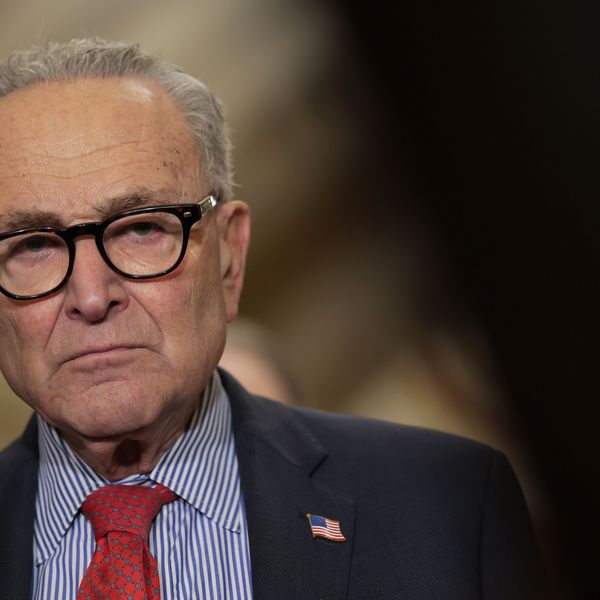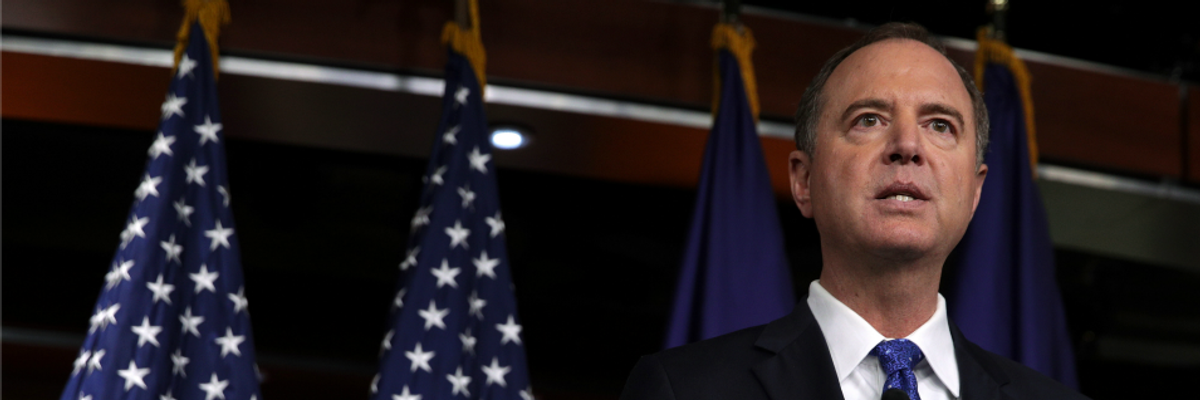A huge national spotlight is now on Adam Schiff, the member of Congress leading the impeachment inquiry. In his tenth term, Schiff is really going places. But where is he coming from?
This year, as chair of the House Intelligence Committee, he has relentlessly built a case against a horrendous president. For progressives eager to see Donald Trump impeached, Schiff is an enemy of their enemy. But whether he's a friend is another matter.
"Schiff's record on foreign policy, civil liberties, human rights and other key issues has often put him more in line with Republicans than with liberal Democrats," international affairs scholar Stephen Zunes told me. "It is ironic, therefore, that Trump and the Republicans are portraying him as some kind of left-winger."
For a backstory perspective on Schiff, I contacted a progressive activist who has been closely tracking his political career for two decades. Howie Klein, the publisher and editor of DownWithTyranny.com, lives in Schiff's congressional district in the Los Angeles area. They met when Schiff was a state senator running for Congress in 2000 against a Republican incumbent.
"While Schiff has emerged as a marquee foe of Trumpism, we should be aware that he remains deeply enmeshed with corporatism and militarism."
"I was all gung-ho and raised a lot of money for him from my music industry colleagues," Klein told me. "I didn't understand at the time that although he was a Democrat, he was a conservative Democrat. There were a couple of hints during the campaign, but it wasn't until he was elected and joined the Blue Dogs and started voting that I realized that we had traded a right-wing Republican for a GOP-light Democrat."
Schiff wasn't merely playing it safe with his constituents. "It was a rapidly changing district that in just a few years went from red to swing to blue to deep blue," Klein recalled. "The most Schiff was willing to move was from the Blue Dogs to slightly less odious New Democrats."
As for the dynamics that have elevated Schiff to star on the House impeachment stage, Klein commented: "Most of Nancy Pelosi's committee chairs do exactly what she tells them to do, but Schiff seems to be even more exact than most of the others. He's her guy and she has given him a perfect opportunity to transform himself into a political celebrity."
Alignment with the most powerful Democrat on Capitol Hill has paid off for Schiff. This month, Speaker Pelosi skipped over Jerrold Nadler--who, as Judiciary Committee chair would have ordinarily taken the lead--instead choosing to appoint Schiff to drive the impeachment train.
Schiff is tenaciously challenging a despicable president who should be impeached. At the same time, while Schiff has emerged as a marquee foe of Trumpism, we should be aware that he remains deeply enmeshed with corporatism and militarism.
Schiff is significantly more hawkish than Nadler. While Nadler was one of the 59 House Democrats who voted against the National Defense Authorization Act for fiscal year 2019, Schiff voted yes on that landmark measure--which abetted Trump's push for a massive two-year 11 percent boost in military spending. Pelosi, who also voted for the bill, proudly wrote to Democratic colleagues: "In our negotiations, Congressional Democrats have been fighting for increases in funding for defense."
The Pentagon has been able to rely on Schiff to vote for military spending increases throughout his career. And he has rarely done anything contrary to the interests of the military-industrial complex.
In March 2015, when Saudi Arabia launched air strikes against Yemen that began the ongoing murderous intervention, Schiff went out of his way to voice support. The Obama administration, he declared, "made the right decision" to support the Saudi bombing. Said Schiff: "The military action by Saudi Arabia and its partners was necessitated by the illegal action of the Houthi rebels and their Iranian backers."
After more than four years of vast suffering and death among Yemini people, Schiff recently played a positive role as he co-sponsored an amendment (accepted by the House) that could end U.S. participation in the Saudi-led war in Yemen.
Aside from his reflexive support for military spending hikes, Congressman Schiff's most egregious roles have involved policies in the Middle East. He voted to greenlight the U.S. invasion of Iraq that began in March 2003. "Schiff was among the right-wing minority of House Democrats who sided with Bush and Cheney over the broad consensus of Middle East experts, international legal scholars, independent arms control analysts and others who warned that an invasion of Iraq was unnecessary, illegal, and would be utterly disastrous," said Zunes, a professor of politics at the University of San Francisco.
Zunes added: "Contrary to the wishes of the majority of his liberal California constituents, Schiff effectively renounced the UN Charter and the Nuremberg Principles by voting to authorize it and lied about Iraq having 'weapons of mass destruction.' In doing so, he contributed to the deaths of 4,500 young Americans and close to 1 million Iraqis and others, wasted $2 trillion of our tax dollars, helped destabilized the region, and helped inflict enormous environmental damage, including a huge carbon footprint."
Notably unconcerned about the human rights of Palestinian people, Schiff has consistently run interference for the Israeli government. "One of the great ironies of Schiff being accused of having a liberal bias in leading the impeachment investigation is that he was one of the leading critics of a 2009 United Nations investigation of violations of international law by both Israel and Hamas," Zunes said. "He co-sponsored a resolution claiming that the 585-page report, which confirmed earlier assessments by Amnesty International and Human Rights Watch and criticized both sides, was somehow 'irredeemably biased' against Israel and that its well-documented findings were 'sweeping and unsubstantiated' and therefore 'unworthy of further consideration or legitimacy.' Like Republican critics of his impeachment hearings, Schiff has shown himself unwilling to consider the actual facts uncovered through a meticulously detailed investigation and instead simply attacks those doing the investigating."
In December 2016, as President Obama was preparing to leave office, Schiff urged him to veto UN Security Council Resolution 2334. Schiff was among the lawmakers who couldn't stand the idea that Israel would be censured for violating international law with its settlement building in the occupied Palestinian territories.
With Schiff's historic role in the impeachment process gearing up this week, I contacted Marcy Winograd, who mounted a strong primary challenge as a peace candidate 10 years ago in the LA area, throwing a scare into hawkish Congresswoman Jane Harman. Winograd said: "I would ask House Speaker Pelosi and Congressman Schiff, a skilled prosecutor undaunted in the face of Trump's relentless tirades, to broaden the laser-like impeachment focus on Trump's demagogic extortion of Ukraine to include abuses of executive power that might resonate more with the American people while not provoking a new Cold War nuclear arms race with Russia."
Schiff's front-seat presence on the Russiagate bandwagon has done wonders for his mega-media profile. He's well-positioned to run for California's Senate seat now held by 86-year-old Dianne Feinstein, while big money has been pouring in faster than ever.
Schiff brought in $6.25 million for his campaign committee during the last two-year election cycle, and he ended 2018 with $4.7 million in cash on hand. This year, as the intelligence committee chair, Schiff has picked up the fundraising pace, raising $4.37 million in just nine months; he now has close to $7 million in the bank. Schiff certainly doesn't need the money to get re-elected in his heavily Democratic district, where he has received more than three-quarters of the votes in every one of this decade's elections. His interest in higher office seems clear.
Right now, right-wing media are teaming up with the White House and congressional Republicans to vilify Adam Schiff while he leads impeachment efforts in the House. Under the circumstances, progressives might view him as an ally. But any alliance with the likes of Schiff should be understood as tactical and temporary.
Correction: An earlier version of this article misstated Schiff's run for Congress in 2000 as taking place in 1990. That error has been fixed.




